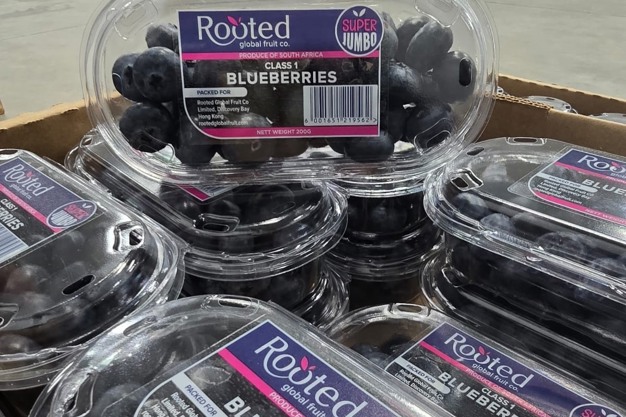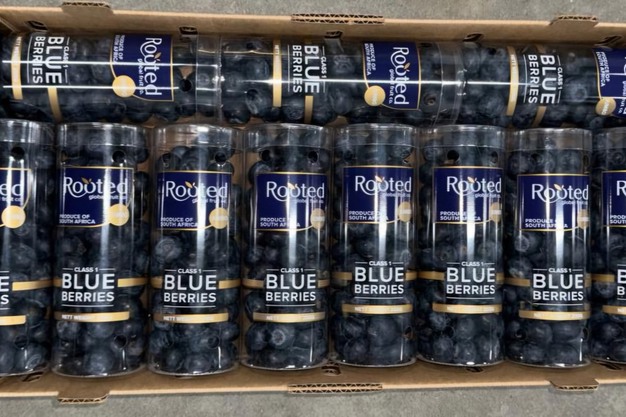Blueberries from Zimbabwe and Namibia are starting to wind down with South African supply reaching higher levels after a slow start. According to Ryno Palm from the South African and Hong Kong based exporter Rooted Global Fruit Company, "Markets have started to change drastically in the last two weeks with Peru appearing on the scene. The long and cold winter has certainly affected blueberry production in Southern Africa. We really kicked off late because of this."

Ryno Palm. marketing director of the South African and Hong Kong based exporter Rooted Global Fruit Company.
As Peru lands more blueberry volumes in Europe and the UK, prices have started to lower a lot faster. "They currently land sea cargo volumes in Europe, UK and South-East Asia. They have a greater focus on Europe, with mostly bulk packaging. Prices have come down by almost €3 per kg in the last 10 days. Air cargo to Europe and the UK is actually no longer an option for SA producers at all," notes Palm.

Namibia and Zimbabwe's blueberry seasons ending
He says the north of Namibia (the Rundu area) still had very cold nights until early August and the producers had to do everything in their power to limit frost damage. "The helicopters were constantly on standby to whip the early cold and frosty air of the morning around a bit so that the small berries and the plants were not damaged." Aside from all the attempts to limit damage, the harvest was very disappointing in the end. Namibia is not a large producer, but in proportion they have had a very low volume year. There are basically four notable blueberry farms in Namibia and two of them are in the Kavango district. One is an existing project, and their window between very cold and very hot was so short that they could literally harvest almost only for five or six weeks. This caused them to be able to harvest only 25% of what they had budgeted. The other farm in the area is new and young plants can't really give a replay of the situation. In the south of Namibia, it was also difficult. I think Namibia's biggest challenge was the climate. Too cold at first and then too hot. The season is coming to an end entirely," explains Palm.

Zimbabwe produces their blueberries mostly in a 100 km radius around the capital Harare. "They do mostly air freight, except for the early berries of April, May and June, which sells mainly in South Africa. Supermarkets like Woolworths buy a lot of berries from Zimbabwe and pay good prices. Zimbabwe and the north of Namibia are fairly at the same latitude, but Zimbabwe does not have a similar risk of cold damage in winter. The Zimbabwe volumes are down around 20% compared to the initial estimate. The season is basically coming to an end with very small volumes still being harvested. The Zimbabwe season usually runs from April/May to September," states Palm.
South African blueberries available until Christmas
The South African season has also slowly come out of the blocks notes Palm. "The Late cold is the main reason. The production areas are clearly separated between North and South. The North - Limpopo and surrounding areas - is about 15% to 20% down on production. The South - Southern Cape, Boland - is currently well on track but also much later than in previous years. My feeling is that we're going to end up much closer to estimated volumes. Good pollination and fruit numbers indicate a good harvest. Fruit size looks slightly better than in previous seasons. South Africa should have good volumes at least until Christmas. The warm weather at the end of the year may cut the season a little short. However, there are customer volumes available through the first week of January," notes Palm.

Blueberry markets see good demand
Palm says the berry demand is good worldwide. "World production is reaching a plateau and demand is increasing. I reckon the medium term in blueberry sales should do well and producers should be able to maintain good returns with the new genetics that are available, provided you have already created infrastructure. Starting from scratch with blueberry is incredibly expensive and this is most likely the reason why we are seeing a flattening in blueberry production."

"The one important thing that everyone has to reckon with is that the UK and Europe still remain the market that can handle the volume. Either from Peru or South Africa. So everyone with significant volume is now loading ocean freight and keeping their retail order going in this market. The East/Asia's demand is consistently good. Prices are very stable and slightly higher than EU/UK. Here, air freight is still an option, but the pressure is increasing especially in the 14mm berry size band. The Jumbo (18mm)'s demand remains fairly constant and the price is also stable. The little bit of 22mm berry that goes here is doing well and the demand remains very strong," concludes Palm.
 For more information:
For more information:
Ryno Palm
Rooted Global Fruit Co
Tel: +27 83 632 5004
Email: rpalm@rootedglobalfruit.com
www.rootedglobalfruit.com
